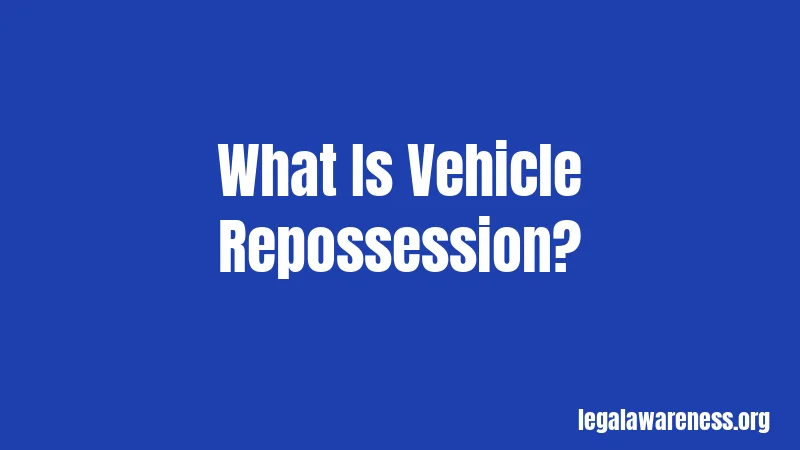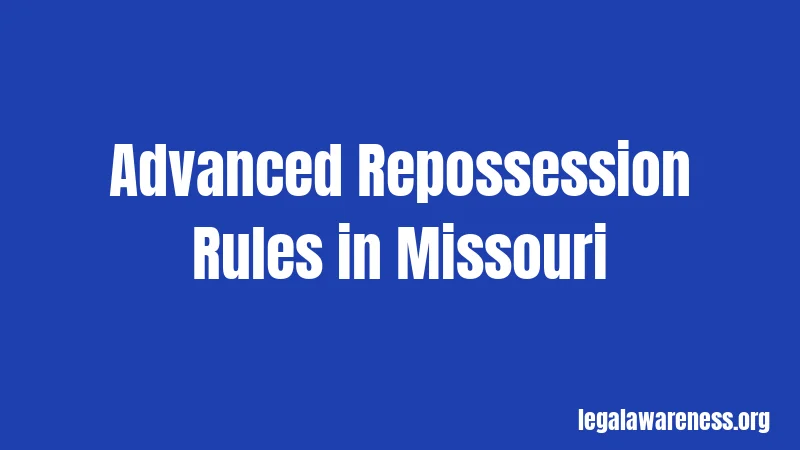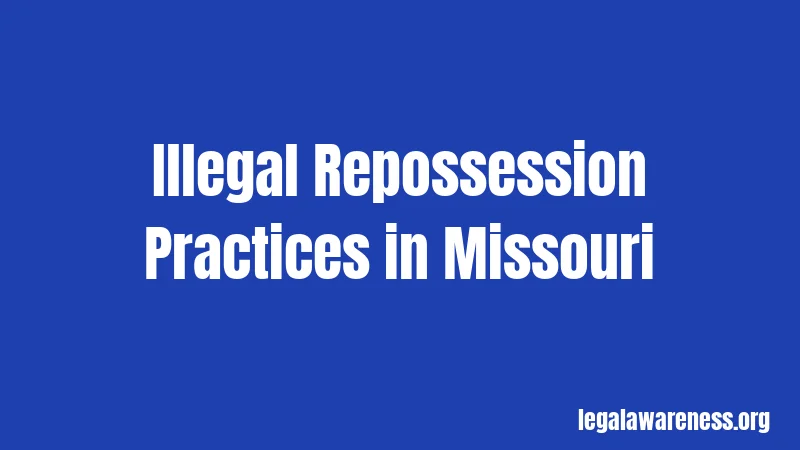Missouri Repossession Laws (2026): What Happens When You Fall Behind
Most people have no idea what happens after they miss a few car payments. Seriously. But in Missouri, repossession can happen faster than you think, and the laws around it are pretty strict. If you have a loan on your car, truck, or other vehicle, you need to understand these rules. This article breaks down exactly what lenders can and can’t do in Missouri.
Here’s the thing: you have rights. Even if you’re behind on payments, the law protects you in specific ways. Let’s talk about what those protections are and what you need to watch out for.
What Is Vehicle Repossession?

Repossession is when a lender takes back a vehicle because the borrower stopped making payments. Think of it like this: you borrow money to buy a car. The car acts as collateral, meaning the lender owns it until you pay off the loan. If you stop paying, the lender can legally take the vehicle back.
Now here’s where it gets interesting. Not all repossessions happen the same way. Some are legal. Some cross the line. Missouri has specific rules about when, where, and how a lender can repossess your vehicle. Breaking these rules can actually get you money in damages.
Basic Missouri Repossession Laws
When Can a Lender Repossess Your Vehicle?
In Missouri, a lender can repossess your vehicle when you’re in default. But what does default actually mean? Pretty straightforward, honestly: it usually means you’ve missed one or more payments on your loan.
Here’s the important part: the loan agreement spells out the exact default terms. Some contracts let lenders repossess after one missed payment. Others allow one or two missed payments before repossession kicks in. Check your paperwork. Your specific loan agreement determines when repossession can legally happen.
Want to know something most people don’t realize? The lender must follow the terms exactly as written in your contract. They can’t just decide to repossess whenever they feel like it. They have to stick to what you both agreed to.
No Notice Required in Missouri
Here’s where Missouri law differs from many other states: lenders don’t have to give you notice before repossessing your vehicle. That’s right, no warning call. No letter in the mail. They can show up and take your car, and it’s completely legal as long as you’re actually in default.
This part surprises a lot of people. Your lender can repossess your vehicle without telling you it’s coming. But wait, there’s an important limit on this: they can’t breach the peace while doing it.
What Is “Breach of the Peace”?
Okay, pause. This one’s important. Even though lenders can repossess without notice, they absolutely cannot breach the peace during the process. What does that mean? Basically, they can’t use force, threats, or intimidation. They can’t break into your home. They can’t damage your property.
Think of it like this: if a repo agent shows up to your driveway and peacefully takes your car, that’s legal. If they threaten you, damage your fence, or forcefully enter your garage, that’s a breach of the peace, and it’s illegal.
Common examples of breach of the peace include:
A lender parking on your lawn or blocking your driveway aggressively. An agent cursing at you or threatening you. Entering your home without permission. Damaging your property or your neighbors’ property while taking the vehicle.
If your lender breaches the peace, you have legal options. You can potentially sue for damages and stop the repossession. This is a big deal.
The Right to a Hearing
Stay with me here. Once your vehicle is repossessed, Missouri law doesn’t automatically give you a hearing right before the lender sells it. But your contract might include hearing rights. Check your loan agreement carefully. Some lenders do offer pre-sale hearings, and if they promised it, you can hold them to it.
Advanced Repossession Rules in Missouri

What Happens to Your Personal Property?
Let’s say your car gets repossessed. You left some stuff inside: your sunglasses, your phone charger, important documents. What happens to it all? Great question. The lender must return your personal property. They can’t keep it or sell it with the vehicle.
Wondering if this applies to you? It does if you ask for your belongings. Contact the lender right away and request your personal property. Put it in writing if possible. The lender has to return what’s not attached to the vehicle.
The Right to Redeem Your Vehicle
Here’s something important: you can get your car back even after it’s repossessed. This is called redemption. In Missouri, you can redeem your vehicle by paying off the entire loan amount plus the costs of repossession. This includes the tow, storage, and any reasonable repair costs.
But there’s a catch: you have to act fast. Most lenders require redemption before they sell the vehicle. Once it’s sold at auction, redemption is over. So if your car is taken, move quickly if you want it back.
How Long Can a Lender Hold Your Car?
The lender can hold your repossessed vehicle while they figure out what to do with it. But they can’t hold it forever. They need to sell it within a reasonable time. In Missouri, “reasonable time” typically means a few weeks to a few months, depending on the situation.
Make sense, right? The lender wants to recover their money, so they’ll sell quickly. This works in your favor if you want to redeem the vehicle. Act within that window.
The Right to Notice Before Sale
Okay, here’s where Missouri law kicks in to protect you again. Even though the lender didn’t have to give you notice before repossessing, they must give you notice before selling the vehicle. You need to know when and where the sale will happen.
This notice requirement is crucial. It gives you time to redeem the vehicle or prepare for the financial aftermath. The lender must send notice with enough time for you to take action. Typically, this is at least 10 days before the sale.
Deficiency Balances and What You Owe
Let’s say your car sells at auction, but the sale price doesn’t cover your loan balance. That gap is called a deficiency. Does Missouri law let lenders sue you for that deficiency? Yes, it does. Unlike some states, Missouri doesn’t have a law preventing deficiency judgments.
This means after the sale, you could still owe money. The lender can take you to court to collect the difference. This is honestly one of the most important parts to understand. You’re not off the hook just because the car is gone.
However, here’s where you get a break. The lender must follow specific rules when selling the vehicle. They have to use commercially reasonable methods. They can’t sell it for pennies on the dollar just to punish you. If they don’t sell reasonably, a court might reduce or eliminate your deficiency.
Illegal Repossession Practices in Missouri

What Lenders Absolutely Cannot Do
Making animals fight each other is against the law. Similarly, certain repossession practices are illegal in Missouri. A lender can’t enter your home without permission. They can’t repossess a vehicle from a public street without proper documentation. They can’t damage your property.
They can’t threaten, intimidate, or harass you during repossession. They can’t repossess the wrong vehicle by mistake and leave it taken. If they do any of these things, it’s illegal.
Harassment and Repeated Attempts
Confused about what counts as harassment? Let me break it down. If a lender repeatedly tries to repossess your vehicle after you’ve paid, that’s harassment. If they call you constantly with threats, that’s harassment. If they contact your employer or family members aggressively, that crosses the line.
Missouri consumer protection laws cover repo harassment. If you’re being harassed, document everything. Write down dates, times, and what was said. Take screenshots of texts or emails. This evidence helps if you need to take legal action.
Wrong Vehicle Repossession
Not sure if this happens often? More often than you’d think. Sometimes repo agents take the wrong car by mistake. If this happens to you, the lender has made a serious error. You can sue for damages. This is pretty straightforward legally.
Your Rights During Repossession
The Right to Know Why
You have the right to know why your vehicle is being repossessed. If a lender shows up at your door, they should be able to tell you what payments you’ve missed. They should have documentation. Don’t let anyone take your car without a clear explanation.
The Right to Protect Yourself
You’re not alone; this confuses a lot of people. You have the right to protect yourself if a repo agent appears at your door. You can:
Ask to see proof that they’re authorized to repossess. Take photos or videos of the process. Call the police if you feel threatened. Tell them to leave if you don’t believe they have the authority. Write down their name, company, and vehicle information.
The Right to Affordable Payment Plans
Here’s where things get serious. Before a lender repossesses, they should work with you on a payment plan. Missouri law encourages lenders to find alternatives to repossession. If you can’t make your full payment, contact your lender immediately. Explain your situation. Many lenders will negotiate rather than repossess.
Recent Changes and Updates
Missouri repossession laws have remained relatively stable, but enforcement has become stricter. As of 2024, courts have been more willing to punish lenders who breach the peace during repossession. This means your rights have actually gotten stronger in recent years.
Additionally, the Federal Trade Commission has cracked down on aggressive repo practices nationwide. While Missouri’s specific state laws haven’t dramatically changed, federal enforcement affects how lenders operate here.
What Happens After Repossession
The Sale Process
Once your vehicle is repossessed, the lender will sell it. The sale usually happens at an auction. The lender sends it to a dealer or auction house. The vehicle sells to the highest bidder. All of this should happen within a reasonable timeframe.
You might be wondering: can I buy it back at auction? Technically yes, but you’d need to bid like anyone else. You won’t get special pricing just because it’s your vehicle.
Your Credit Report
Repossession stays on your credit report for seven years. This seriously hurts your credit score. It makes future borrowing expensive and difficult. This is honestly one of the worst parts of repossession, besides losing your vehicle.
If you’re facing repossession, do everything you can to avoid it. A late payment is bad for your credit. A repossession is much worse.
Tax Implications
Here’s something people often miss. If the sale price is less than what you owe, the lender might cancel the debt. That forgiven debt could be counted as income for tax purposes. You might owe taxes on it. Talk to a tax professional if this happens to you.
How to Protect Yourself from Repossession
Stay Current on Payments
The best protection is simple: don’t miss payments. Stay with me here: this seems obvious, but many people fall behind unexpectedly. If you’re struggling, don’t wait. Contact your lender immediately.
Know Your Loan Agreement
Read your loan contract carefully. Know exactly when default occurs. Know what the repossession terms are. Understand your redemption rights. Most people never read this stuff. You’re ahead if you do.
Keep Your Vehicle Secure
Repo agents look for vehicles in accessible places. Park in a garage when possible. Don’t leave your car in obvious spots overnight. While this seems like common sense, it actually matters.
Document Everything
Keep records of every payment you make. Get receipts. Save bank statements showing your payments. If there’s ever a dispute about whether you paid, you have proof.
Get Help If You’re Struggling
Credible nonprofit credit counseling is available for free. The National Foundation for Credit Counseling offers legitimate help. They can negotiate with lenders on your behalf. They can set up payment plans. Getting professional help early can prevent repossession.
Frequently Asked Questions
Can a lender repossess my car for one missed payment? It depends on your loan agreement. Some contracts allow repossession after one missed payment. Others require two or three. Check your specific contract to know for sure.
What should I do if my car is repossessed illegally? Contact a lawyer immediately. You may have grounds to sue. Document everything about how the repossession happened, including any breach of the peace.
Can I get my car back after repossession in Missouri? Yes, by redeeming it. You can pay off the full loan amount plus repossession costs before the lender sells it. After the sale, redemption is no longer possible.
Will I still owe money after my car is sold? Possibly. If the sale price doesn’t cover your loan balance, you owe the deficiency. The lender can sue you in court to collect this amount.
How long does repossession stay on my credit report? Seven years. It’s one of the most damaging things that can happen to your credit. The impact decreases over time, but it affects your creditworthiness for years.
Can a lender repossess my car from my garage? Not without breaching the peace. They can’t break in or force entry. However, if your garage is unlocked and accessible, they might legally take it. Keep your vehicle in a locked garage when possible.
What counts as a breach of the peace during repossession? Threats, intimidation, physical force, property damage, or entering your home without permission. If any of these happen, it’s illegal.
Do I have a right to a hearing before repossession? Not automatically under Missouri law. However, your loan agreement might include this right. Check your contract.
Final Thoughts
Now you know the basics of Missouri repossession laws. The key takeaway: lenders have strong rights in Missouri, but those rights have limits. They can’t breach the peace. They can’t harass you. They must give notice before selling your vehicle.
Most importantly, you’re not powerless. If you’re facing repossession, act quickly. Contact your lender about payment options. Seek professional credit counseling. Understand your redemption rights. A lawyer can help if illegal practices occur.
Stay informed, stay proactive, and when in doubt, reach out to a legal professional or your state’s Attorney General office. Your vehicle and your financial future are worth protecting.
References
Missouri Uniform Commercial Code (UCC) Section 9-609 – Official statute covering secured transactions and repossession
Missouri Attorney General Consumer Protection Division – State enforcement and complaint resources
Missouri Court Rules for Collections and Repossession – State court system information
Federal Trade Commission: Vehicle Repossession – Federal guidelines and consumer rights
National Foundation for Credit Counseling – Free nonprofit credit counseling services
Consumer Financial Protection Bureau (CFPB) – Federal consumer protection resources and complaint filing
Missouri Legal Services: Consumer Rights – Free legal assistance for eligible Missourians
